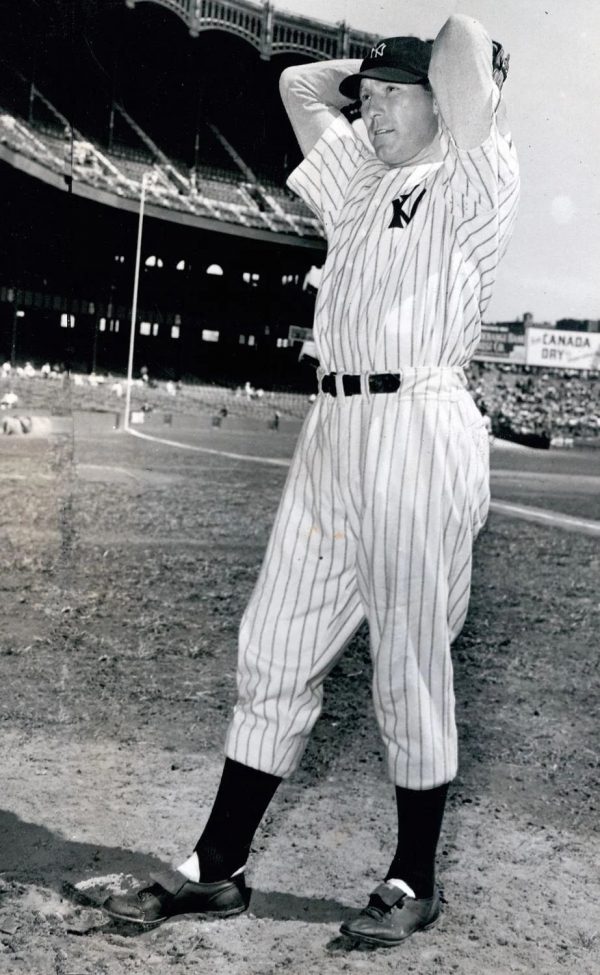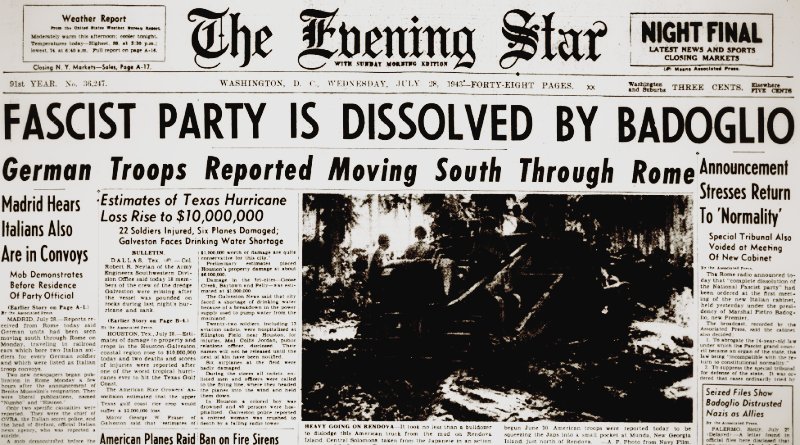World War II Chronicle: July 28, 1943
Click here for TODAY’S NEWSPAPER
It’s not in the paper, but Pvt. Red Ruffing of the Sixth Ferrying Group threw a no-hitter today against former teammate Joe DiMaggio’s Santa Ana Army Air Base. He struck out Joltin’ Joe and only a fielding error kept Red from having a perfect game.
It’s odd to see some athletes who are fit enough to run rings around their competitors, but are disqualified from service while others like Ruffing are taken in. The six-time World Series Champion 39 years old when he was drafted and was missing several toes from a mining accident when he was a teenager. He wasn’t jumping out of airplanes though; he played ball.
Ruffing’s arm got him into the Hall of Fame, but he swung a pretty hot bat too. In 1935 he led the Yankees in both wins and batting average. Red’s mark of .339 was 10 points higher than Lou Gehrig. The Iron Horse played every day so he had 559 more plate appearances than Ruffing, but how about this: they both hit 10 doubles. When Ruffing joined the Yankees in 1930 he batted .374, just five points behind Gehrig. Call him the Shohei Ohtani of the 1930s.

Sports on page 17. Bucky Harris is out as manager of the seventh-place Phillies, with Fat Freddie Fitzsimmons taking his place.
Roving Reporter by Ernie Pyle
WITH THE U.S. NAVY IN THE MEDITERRANEAN — Our first day at sea on the way to invade Sicily was truly like a peacetime Mediterranean cruise. The weather was something you read about, gently warm and sunny and the sea as smooth as velvet.
We were kept at a sharp alert for at any moment we could be attacked by a submarine, surface ship or airplane and yet any kind of an attack — even the fact that anybody would want to attack anybody else — was so utterly out of keeping with the benignity of the sea that it was hard to take seriously the possibility of danger.
I had thought I might be afraid at sea, sailing in this great fleet that by its very presence was justification for attack and yet I found it impossible to be afraid. As we sailed along I couldn’t help but think of a paragraph of one of Joseph Conrad’s sea stories I had read just a few days before. It so perfectly expressed our feeling about the changeless sea that I’m going to quote it here.
It was in a story called “The Tale,” written about the last war. In it Conrad said:
“What at first used to amaze the commanding officer was the unchanged face of the waters, with its familiar expression, neither more friendly nor more hostile. On fine days the sun would strike sparks upon the blue: here and there a peaceful smudge of smoke hangs in the distance, and it is impossible to believe that the familiar clear horizon traces the limit of one great circular ambush. One envies the soldiers at the end of the day, wiping the sweat and blood from their faces, counting the dead and fallen to their hands, looking at the devastated field, the torn earth that seems to suffer and bleed with them. One does, really. The final brutality of it — the taste of primitive passion — the ferocious frankness of the blow struck with one’s hand — the direct call and the straight response. Well, the sea gives you nothing of that, and seems to pretend that there was nothing the matter with the world.”
And that’s the way it was with us and it had never occurred to me before that that might be the way in enemy waters during wartime. Why it remained that way we shall never know but throughout our long voyage and right up to the final dropping anchor we never had one single attack from above, from below, nor from over the horizon.
Dusk brought a change. Not feeling fear at all but somehow an acute sense of the drama we were playing at that moment on the face of the sea that has known such a major share of the world’s great warfare. In the faint light of the dusk, forms became indistinguishable. Nearby ships were only heavier spots against the heavy background of the night. Now you thought you saw something and now there was nothing. The gigantic armada was on all sides of us, there only in knowledge.
Then out of nowhere, a rolling little subchaser took on a dim shape alongside us and with its motors held itself steady about 30 yards away. You could not see the speaker but a megaphoned voice came loudly across the water telling us of the motor breakdown of one of the troop-carrying barges farther back.
We megaphoned advice over to him. His response came back. Out in the darkness the voice was young. You could picture a boyish skipper over there in his blown hair and his life jacket and binoculars, rolling to the sea in the Mediterranean dusk.
Some young man who had so recently been so normally unaware of any sea at all — the bookkeeper in your bank, perhaps, and now here he was a strange new man in command of a ship, suddenly transformed into a person with awful responsibilities carrying out with great intentness his special small part of the enormous aggregate that is our war on all the lands and seas of the globe.
In his unnatural presence there in the rolling darkness of the Mediterranean you realized vividly how everybody in America has change how every life suddenly stopped and suddenly began again on a different course. Everything in this world has stopped except war and we are all men of new professions out in some strange night caring for each other.
That’s the way you felt as you heard this kid, this pleasant kid, bawling across the dark waters strange nautical words with disciplined deliberation that carried in them the very strength of the sea itself, the strong matured words of the Captain of his own ship, saying “Aye, aye, sir. If there is any change I will use my own judgement and report to you again at dawn. Goodnight, sir.”
Then the whole darkness enveloped the American armada. Not a pinpoint of light showed from those hundreds of ships as they surged on through the night toeard their destiny, carrying across this ageless and indifferent sea tens of thousands of young men of new professions, fighting for… for… well, at least for each other.
Evening star. (Washington, D.C.), 28 July 1943. Chronicling America: Historic American Newspapers. Lib. of Congress.
https://chroniclingamerica.loc.gov/lccn/sn83045462/1943-07-28/ed-1/
